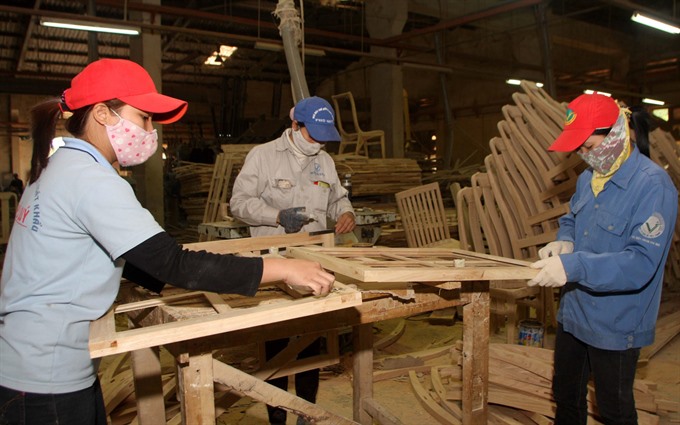_med.jpg) Economy
Economy

Vietnamese firms must draw up long-term business strategies to exploit opportunities in the European Union (EU), as the EU-Việt Nam Free Trade Agreement (EVFTA) will come into force by 2018.
 |
| Phú Quý Wood Processing Plant in the central province of Quảng Bình makes wood products for export to European Union markets. Vietnamese firms are urged to have long-term business strategies to expand exports to the EU as the trade deal will come into effect by 2018. – VNA/VNS Photo Trần Việt |
HÀ NỘI – Vietnamese firms must draw up long-term business strategies to exploit opportunities in the European Union (EU), as the EU-Việt Nam Free Trade Agreement (EVFTA) will come into force by 2018.
The EU, an open market with an integrated legal framework for all its members, can offer more export opportunities to local firms, experts told Vietnam News Agency correspondent.
In the past few years, trade between Việt Nam and EU has been on a continuous rise. In the first half of this year, the total import-export turnover to EU touched US$21.2 billion, posting a 9.05 per cent year-on-year rise. Of this, Việt Nam’s exports to EU were worth $16.2 billion and imports were $4.97 billion, both recording an 8.68 per cent and 10.28 per cent increase, respectively, from the same period last year.
The annual growth rate of Việt Nam’s export turnover to EU could be 4 to 6 percentage points higher once the EVFTA comes into effect. The trade pact can help Việt Nam promote the export of key products such as garments and textiles, leather shoes and seafood to one of the most developed economic regions in the world.
Experts said Vietnamese companies had so far only been shipping raw materials, though EU had brought the biggest export turnover for the country. Made-in-Việt Nam products are tough to find a place in big commercial centres in EU.
Businesses said they were concerned that their technology may not meet the requirements, so they were sticking to export raw products and letting EU firms package and label the products. This, however, means that Vietnamese products could lose their trademark if they did’t register brand names and geographical location.
Đặng Hoàng Hải, director of the industry and trade ministry’s EU Market Department, said local businesses should know the tax cut roadmap under the EVFTA, make precise calculations for their products and draw up long-term export plans.
Bùi Huy Sơn, director of the ministry’s Việt Nam Trade Promotion Agency (Vietrade), said the country had the ability to conquer the EU market once the EVFTA takes effect. Việt Nam had two years to improve its capacity through reforms of mechanism and policies.
Trương Đình Tuyển, former minister of commerce, said the EVFTA would mean greater export opportunities for Vietnamese firms as the EU market was bigger than the US and Japan in terms of marketshare and value.
However, the EU is a demanding market, and Vietnamese companies can face issues relating to assessment, retention, competition and domination of the market. Tuyển said under the World Trade Organisation principles, the importing companies have the right to initiate anti-dumping duty and impose sanitary and phytosanitary (SPS) non-tariff barriers and technical barriers to trade (TBT).
In addition, Vietnamese companies can be levied anti-dumping taxes if they focus on only one market. Domestic firms should come up with suitable policies to avoid concentrating on a certain market or a specific product.
Việt Nam’s strength of offering inexpensive products may no longer be an advantage once the EVFTA commitments are applicable. Product quality and trademark will be the decisive factors in the market. It will be useful if local businesses develop items that are in low supply instead of trying to offer similar products at lower costs.
Valentin Trần, exporting director of Casino, said he was optimistic about Việt Nam’s exports to the EU and that Vietnamese goods would benefit from zero tax. Firms should understand the market properly.
Vietnamese businesses should participate in exhibitions and fairs in the EU and visit its supermarket chains to understand consumption habits. The most important thing to promote export is to pay attention to the quality of goods and meet international standards, he said. -- VNS




